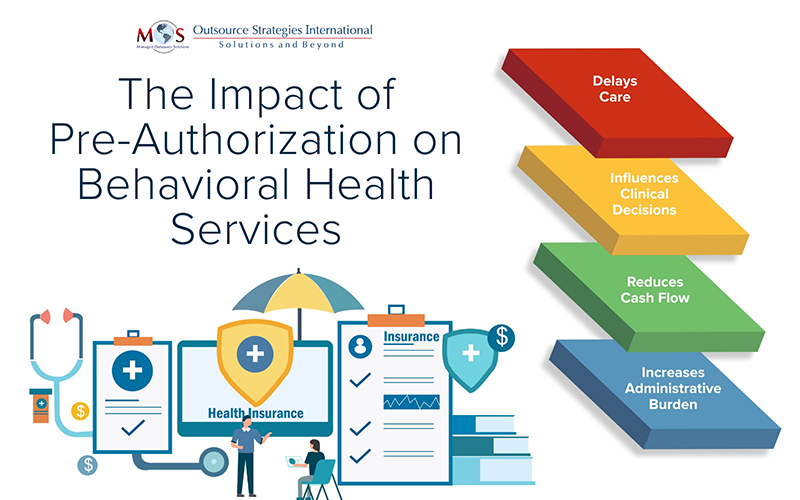Obtaining behavioral health prior authorization has been considered a longstanding obstacle in providing timely mental healthcare. While intended to be used as a cost containment tool by insurers, the administrative procedures involved in prior authorization requirementoften restrict or deny patients access to behavioral health services. Recognizing the toll this process takes on both providers and patients, an industry-wide reform is set to begin by 2026.
According to a recent Behavioral Health Business report, major insurance companies have pledged to simplify procedures and reduce the amount of services requiring preauthorization. By implementing a streamlined, electronic-based process, the new system aims to issue faster and more transparent approvals. While the initial focus is on physical health services, reforms targeting behavioral health are planned for the later phase, aiming to ease access to critical services such as therapy and substance use treatment.
As mental health practices may not always be able to stay updated on the latest rules and payer-specific changes, partnering with an experienced insurance authorization company can ensure compliance, reduce administrative burden, and maintain uninterrupted care delivery.
Why Does Behavioral Health Service Require Prior Authorization?
Let’s go through the key reasons why the insurance pre-authorization process is needed for mental health services:
- Cost Containment: Pre authorizations are mainly used by insurers to help control healthcare costs. This process helps insurance companies to prevent claims for unnecessary and expensive mental health treatments and services. When the healthcare providers submit a request, insurers cross-check the proposed treatment plan and verify the availability of any less expensive but equally effective options.
- Medical Necessity: Another reason payers require preauthorization is to guarantee the medical necessity of the services to be rendered. Insurance companies conduct a detailed review of the prior authorization requests by evaluating if the proposed treatment is medically necessary and aligned with the patient’s health plan. They may deny, approve, or request for more information, depending on the established medical guidelines.
- Quality Control and Fraud Prevention: Preauthorization also helps maintain quality services by verifying the credentials and qualifications of the healthcare provider. By reviewing and approving quality care only from authorized health professionals, prior authorizations ensure patients receive the best possible treatment. This helps to prevent medical billing fraud and abuse while reducing the risk of unnecessary or inappropriate treatments.
Partner with billing professionals who understand payer-specific requirements for your practice!
Key Effects of Preauthorization on Behavioral Health Services
While intended to control costs and ensure appropriate use of resources, prior authorization often creates challenges for providers in the mental health field, contributing to significant mental health care access barriers:
- Delays Care
One of the most immediate impacts of prior authorization is the delay it causes in providing treatment. For example, a patient needing a new antidepressant might face a delay if the medication requires prior authorization. Timely intervention is critical as delays in therapy sessions, medication prescriptions, or diagnostic assessments may worsen a patient’s condition. Moreover, mental healthcare often involves ongoing sessions or medication adjustments, requiring repeated approvals. In some cases, patients may abandon treatment altogether due to repeated hurdles with insurance approvals.
- Influences Clinical Decisions
Prior authorization requirements sometimes pressurize providers to choose treatments based on insurance convenience rather than clinical judgment. Providers may alter treatment plans to avoid therapies or medications that require authorization, even when they might be the most suitable option. Such restrictions limit the provider’s ability to deliver individualized care. This may lead to the selection of less effective treatments and in turn, poor health outcomes.
- Reduces Cash Flow
Prior authorization processes are often long and complex, resulting in denied claims if paperwork is incomplete or delayed. Denials increase the time and effort required to resolve billing issues, affecting cash flow for providers. Smaller behavioral health practices that operate with limited staff and financial margin may struggle to maintain a strong mental health provider revenue cycle. Not only does this lead to additional operational costs and resources utilization, but it may also prompt providers to limit the number of insured patients they accept. As a result, this creates additional barriers and hinders access to proper care for individuals already struggling with mental health conditions.
- Increases Administrative Burden
Due to inconsistent rules and frequent changes in insurance policies, mental health practices are forced to spend an excess amount of time on administrative work. Staff must gather documentation, complete forms, and communicate with insurers to obtain approvals. All of these consume time that could otherwise be spent on patient care. Smaller mental health clinics often lack a dedicated administrative team, making it difficult to manage both clinical responsibilities and complex insurance requirements effectively. Any error or missing information in approval requests can result in denials, requiring resubmission and further delays. The overall effect is increased overhead costs, staff burnout, and reduced patient satisfaction for behavioral health providers.

Tips to Optimize Mental Health Insurance Authorization Process
Mental health practitioners do not have to accept inefficiencies as the norm. Instead, they can navigate both preauthorization and patient care successfully by implementing strategic process improvements, such as:
- Early eligibility verification: Practices must initiate insurance authorization and eligibility verification process as soon as patient registration is completed. Timely verification allows providers to determine approval policies, coverage limitations, required documentation, and potential out-of-pocket costs before treatment begins.
- Standardized procedures: Create a standardized checklist and procedures to be followed for all patients. This can ensure detailed and comprehensive processes for clinical notes, diagnostic codes, and treatment plans that meet insurer expectations and increases the likelihood of faster approvals and fewer denials.
- Utilize advanced software and automation tools: While the initial investment might be hefty, investing in an electronic prior authorization system and automation tools is cost-saving in the long run by optimizing processes and reducing human errors. These technologies allow real-time communication with payers to reduce paperwork and improve turnaround times, issuing timely approvals.
- Denial management: Practices must have a clear and proactive approach to managing claim denials. This includes regularly tracking the status of requests, identifying common reasons for rejection or denials, and addressing them through improved documentation or procedural updates. A systematic follow-up for resubmissions and appeals can significantly reduce revenue loss and administrative delays.
- Stay updated and train staff: All healthcare practices, regardless of their specialty, must stay updated on the latest legal regulations and insurance policies to ensure compliance. Keeping administrative and clinical staff informed about the latest payer-specific requirements and billing standards with regular training can help to optimize workflows. Well-trained staff is better equipped to handle complex cases, respond to insurer requests efficiently, and maintain a smoother, more effective revenue cycle.
Partnering With Insurance Authorization Services for Behavioral Health
Managing mental health insurance authorization processes in-house requires time, effort, and resources that may adversely affect care delivery and revenue cycle. Mental health providers can reduce the weight of this task by utilizing insurance authorization and verification services. These external teams are not only well-versed in payer-specific requirements and documentation standards but also equipped to handle bulk authorization requests efficiently. Their expertise helps minimize delays, reduce administrative errors, and ensure timely access to care for patients.




